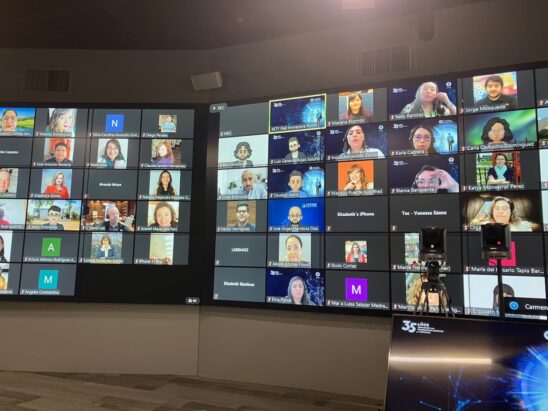
I have just returned from Monterrey in Mexico. I had been invited to join Tec de Monterrey’s celebration of 35 years of innovation in digital and distance education. I had been invited because of my long association with Tec de Monterrey and its online activities.
What was I doing in Monterrey, Mexico?
Tec de Monterrey is a prestigious private university in Mexico with more than 70,000 students in over 25 campuses across Mexico. It can be considered the MIT of Mexico.
I had been invited to give:
- A keynote address during the anniversary ceremony entitled How has online and distance learning changed over the last 35 years and what can we expect for the next 35
years? There were over 200 senior administrators and professors in attendance with many more connected by videoconference.
- A synchronous online question and answer session with over 200 professors from Tec de Monterrey’s 25 campuses across Mexico on the topic of: Develop a future scenario for your education in the digital age.
This was just part of an all-day celebration of 35 years of digital and distance education at Tec de Monterrey.
What did I say?
My keynote was in three parts:
- the development of digital and distance learning over the last 35 years
- a brief overview of the present situation
- my views on likely developments over the next 35 years.
The webinar covered a wide range of excellent questions from the instructors.

I will not bore you with the past (you can find this in my series of posts on my personal history) or the present (of which you are well aware), but here is a very brief summary of my predictions for the next 35 years:
- we can predict with accuracy only about five to ten years ahead
- in most higher education institutions, teaching will be in a variety of delivery modes (fully in-person, a mix of online and in-person, or fully online), but all courses will have at least some digital learning involved
- students will want to choose the mix of online (distant) and in-person that best suits them; it will be a challenge for institutions to be completely flexible, so a more limited range of ‘core modes’ will be offered; this will require good decision-models for deciding the best mix of in-person and digital learning for different courses (which Tec de Monterrey already has: see my brief summary of Tec de Monterrey’s decision-model)
- a major investment will be needed in classroom facilities to enable digital learning to be fully integrated with in-person learning
- AI presents great opportunities and also great challenges for teaching and learning; every institution will therefore need specialists that combine deep knowledge of both AI and pedagogy, who can advise and train instructors.
- specifically in the short term, AI will replace instructors’ delivering content and testing of content acquisition, and will require human instructors to focus on teaching methods and assessments that develop and assess the acquisition of higher level learning skills (such as critical thinking, creativity, and originality); this will in the long run force a major transformation of teaching in most higher education institutions
- the future will result in new technologies that have value for teaching and learning but they will not lead to better learning unless teaching methods change to enable the benefits of technology to be fully exploited
- this will require major changes to the development and training of instructors as well as to their working conditions, but instructors, institutions and unions are not adequately prepared for this.
It was quite a moving experience to meet up with former colleagues from many years ago, and to meet others whom I had not met before who wanted to talk to me. I had wonderful hospitality, as always in Mexico. I have a great affection for Mexico and my amigos. This may well be my last ‘academic’ trip abroad and it will be fitting if that is so.
Could Tec de Monterrey be the current world leader in digital and distance education?
I am not familiar with every higher education institution in the world but from my long and wide experience I doubt if there are many institutions in the world that can match Tec de Monterrey in terms of where it is at the moment in digital and distance learning.
You can get a detailed account of what Tec de Monterrey has already achieved from the following document: Educational Innovation and Digital Education, at the Tecnologico de Monterrey, 2023 but I give below my reasons for Tec de Monterrey’s dominant position:
- An institution-wide commitment to and strategy for digital and distance education. Although implementation varies between different academic departments all are committed to an overall strategy of experimentation in digital teaching and learning.
- An institution-wide commitment to competency and skills-based education supported by the intelligent use of technology. Although instructors and academic departments are still struggling with how to integrate ‘future skills’ with conventional subject content, there is widespread recognition that this is the right direction for the future.
- A deliberate strategy to move towards multi-mode forms of course and program delivery, including fully online, a mix of in-person and digital learning or fully in person, backed by a formal process for deciding on the most appropriate mode for any given course.
- Constant experimentation with the adoption of new technologies for teaching, including AI, virtual and augmented reality, and holograms.
- A past track record that includes more than 4 million online, distant and digital course enrolments over the last 35 years.
- Strong supporting infrastructure: as well as a very strong centre for teaching and learning supporting all academic staff across the institution. Tec de Monterrey also has an externally oriented Institute for the Future of Education with a mission to Improve the lives of millions of people through transforming higher education and lifelong learning around the world
Your turn
Just for fun, what university or college would you nominate as the world’s most advanced in its digital learning and distance education achievements in this moment of time – and why?
Please use the comment box at the end of this post or if you wish to remain anonymous send your nomination and justification by email to me at tony.bates@ubc.ca
Up next
Following my return from my vacation break, I am going to continue my personal history of educational technology, in which will cover why I was sacked by UBC (or at least my version), but more importantly I will discuss what organisational arrangements provide the best support for instructors for digital and distance learning.









 Dr. Tony Bates is the author of eleven books in the field of online learning and distance education. He has provided consulting services specializing in training in the planning and management of online learning and distance education, working with over 40 organizations in 25 countries. Tony is a Research Associate with Contact North | Contact Nord, Ontario’s Distance Education & Training Network.
Dr. Tony Bates is the author of eleven books in the field of online learning and distance education. He has provided consulting services specializing in training in the planning and management of online learning and distance education, working with over 40 organizations in 25 countries. Tony is a Research Associate with Contact North | Contact Nord, Ontario’s Distance Education & Training Network.


Thanks for this, Tony. I shall read more and inwardly digest. Soon. Always happy to hear from you.
Thanks Tony. I had never hear of Tec de Monterrey. Was pleased to read about them. I suspect that the worlds most advanced digital learning is happening in a few libraries in the majority world (who are too busy to think about PR). They might have moved into small scale distance education. However, because their managers are threatened by this technology initiative, because governments don’t appreciate those who do not follow protocols, and because big tech has a strategy for embracing, enclosure and entrenched interests have much to loose, a political or upstart card will be played and the promising initiative will be shut down.
Me alegra que hoy en día la educación de calidad esté al alcance de muchas más personas a lo largo del planeta. Una gran contribución al desarrollo social.